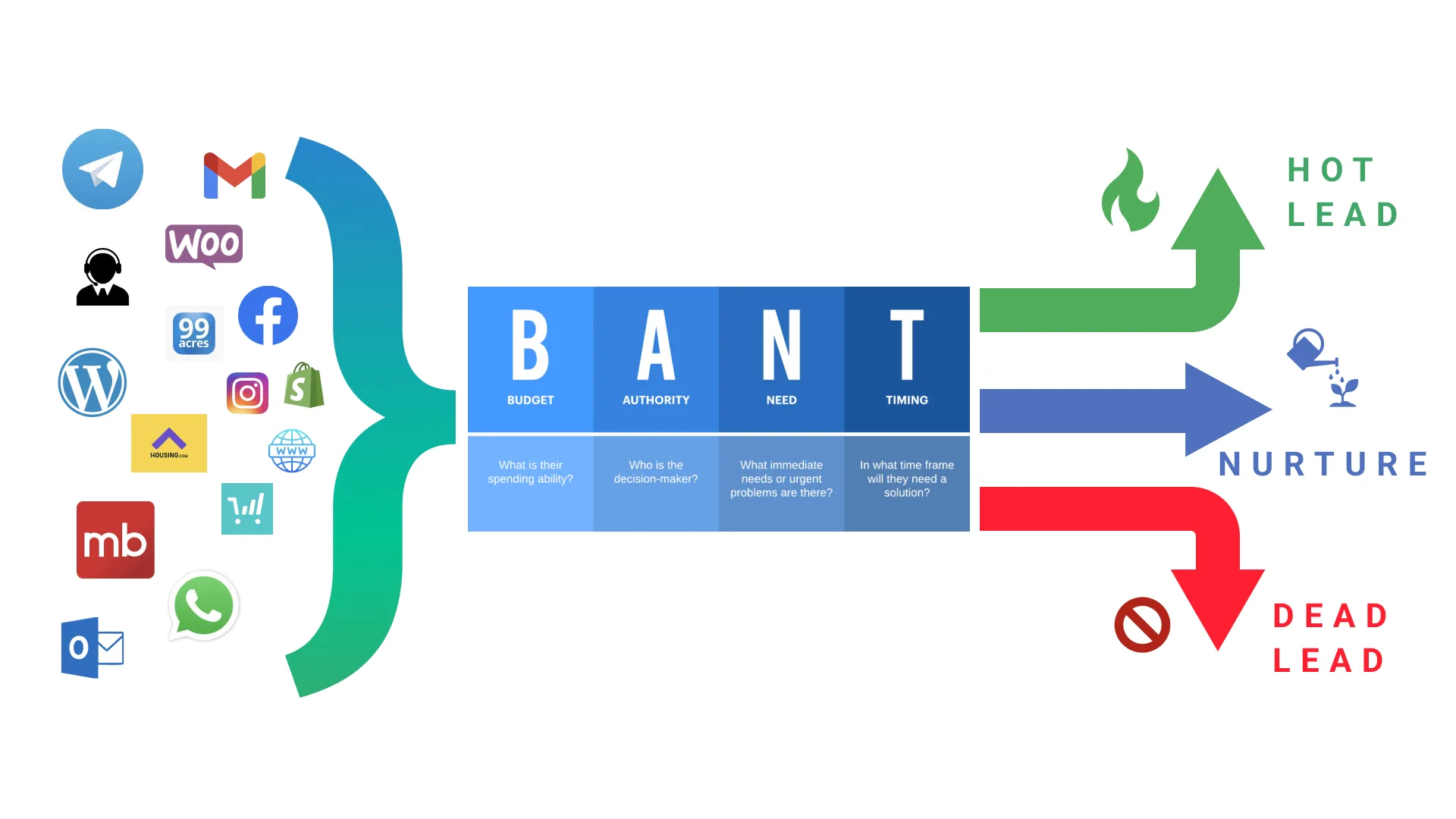BANT Lead Scoring Framework - Improve Lead Qualification


Lead qualification is a critical step in the sales process, enabling sales teams to focus on leads most likely to convert into customers. One widely recognized lead qualification framework is BANT, an acronym for Budget, Authority, Need, and Timeline. This article explores BANT's origins, framework, advantages, disadvantages, and application as a lead qualification methodology.
Origin and History:
IBM first developed BANT in the 1960s as a sales qualification framework. Since then, it has become a popular methodology utilized by Sales teams across industries. BANT is particularly well-suited for initiatives that involve complex sales cycles, high-value transactions, and multiple decision-makers. It has found significant adoption in technology, enterprise software, and professional services.
Many prominent firms still employ the BANT framework to qualify their leads. For example, companies like Oracle, Salesforce, and Microsoft have incorporated BANT into their sales processes in Tech. These organizations recognize the value of assessing a lead's budget, decision-making authority, needs, and timeline to prioritize their sales efforts effectively.
Framework:
The BANT framework consists of four key components:
- Budget: This criterion evaluates whether the lead has the financial resources necessary to purchase. Understanding the lead's budget helps sales teams determine the feasibility of a potential deal and align their offerings accordingly.
- Authority: Identifying the decision-maker or influencer within the lead's organization is crucial for successful lead qualification. Sales teams must engage with individuals with the power and authority to make purchasing decisions or influence decision-making.
- Need: Assessing the lead's pain points, challenges, and requirements is fundamental in determining the product or service's relevance and fit. Understanding the lead's needs allows sales teams to effectively tailor their approach and position their offerings.
- Timeline: The timeline criterion evaluates the lead's urgency and timeframe for the purchase decision. It helps sales teams prioritize their efforts based on the lead's readiness to buy and aligns their sales cycle with the lead's decision-making process.
Advantages:
BANT offers several advantages as a lead qualification framework:
- Efficiency: BANT provides a structured and systematic approach to qualifying leads. By focusing on the critical criteria of budget, authority, need, and timeline, sales teams can quickly assess a lead's potential and prioritize their efforts accordingly.
- Alignment: BANT ensures that Sales Teams align their efforts with the lead's specific requirements and objectives. By understanding the lead's budget, decision-making authority, needs, and timeline, sales professionals can tailor their sales pitch and solutions to the lead's unique challenges.
- Resource Optimization:The BANT framework enables sales teams to allocate their resources efficiently. By qualifying leads based on budget, authority, need, and timeline, organizations can concentrate on Leads most likely to convert, increasing the chances of closing deals and optimizing resource allocation.
Disadvantages:
While BANT has proven to be a valuable lead qualification framework, it does have a few limitations:
- Limited Perspective: BANT focuses primarily on lead qualification's financial and decision-making aspects. It may overlook the complexities of the buyer's journey, including the influence of multiple stakeholders and the emotional and psychological factors that can impact the decision-making process.
- Lack of Flexibility: BANT's linear approach may not adequately account for unique situations or exceptional cases. Use cases with unconventional budgets, decision-making processes, or timelines may need more flexibility, whereas employing BANT may lead to missed opportunities.
Summary:
The BANT framework, emphasizing budget, authority, need, and timeline, provides a comprehensive framework for lead qualification.
Originating from IBM, it has become a widely adopted methodology, particularly in industries with complex sales cycles and high-value transactions. BANT offers the advantages of efficiency, alignment, and resource optimization. However, it does have limitations in terms of limited perspective and flexibility.
Action Points:
- Implementing a BANT Lead scoring Framework on Pronnel: Know More About How You Can Implement a Lead Scoring Mechanism on your Lead Management Board in Pronnel.
- Read more about how you can guide an exploratory Sales discussion to Qualify Leads Based on the BANT Framework. What questions can you ask? How?
- Learn about other Lead Qualification frameworks like ANUM, CHAMP, FAINT, MEDDIC, GPCTBA/C&I
Subscribe To Our Blogs
Get the latest blog notification into your email.